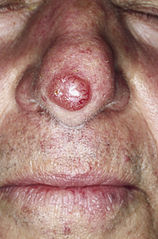DNA Variants Predictive of Autism in Siblings
Pairing RNA with DNA Genetic Testing Improves Risk Assessment for Hereditary Cancers
 Rachid Karam, MD PhD
Director, Ambry Translational Genomics Lab
Ambry Genetics
MedicalResearch.com: What is the background for this study?
Response: Standard DNA testing for hereditary cancer risk excludes large portions of DNA, thereby missing some mutations. In addition, DNA testing can produce inconclusive results and fail to determine that an error in our DNA increases cancer risk. These limitations impact patients and their families because doctors may not have the information needed to recommend appropriate preventive, early detection, or therapeutic steps. Additionally, relatives may not be referred for genetic testing and obtain the care they would otherwise have gotten if they had learned they had mutations. The study looked at how the addition of RNA genetic testing to standard DNA testing for hereditary cancer risk was able to increase diagnostic yield.
The study looked at the first 2,500 patients that received Ambry Genetics +RNAinsight™, paired RNA and DNA genetic testing for hereditary cancer risk. The data from this study showed that the addition of RNA genetic testing to DNA testing (1) identified new mutations that would have been missed with DNA testing alone, and (2) clarified inconclusive results as disease-causing. (more…)
Rachid Karam, MD PhD
Director, Ambry Translational Genomics Lab
Ambry Genetics
MedicalResearch.com: What is the background for this study?
Response: Standard DNA testing for hereditary cancer risk excludes large portions of DNA, thereby missing some mutations. In addition, DNA testing can produce inconclusive results and fail to determine that an error in our DNA increases cancer risk. These limitations impact patients and their families because doctors may not have the information needed to recommend appropriate preventive, early detection, or therapeutic steps. Additionally, relatives may not be referred for genetic testing and obtain the care they would otherwise have gotten if they had learned they had mutations. The study looked at how the addition of RNA genetic testing to standard DNA testing for hereditary cancer risk was able to increase diagnostic yield.
The study looked at the first 2,500 patients that received Ambry Genetics +RNAinsight™, paired RNA and DNA genetic testing for hereditary cancer risk. The data from this study showed that the addition of RNA genetic testing to DNA testing (1) identified new mutations that would have been missed with DNA testing alone, and (2) clarified inconclusive results as disease-causing. (more…)Lumasiran Study Offers Hope For Patients with Debilitating Primary Hyperoxaluria
- Lumasiran is an investigational RNA interference (RNAi) therapeutic in development for the treatment of primary hyperoxaluria type 1 (PH1). PH1 is a rare life-threatening disease in which a enzymatic deficiency in the liver results in pathologic overproduction of oxalate, often leading to recurrent kidney stones and a progressive decline in kidney function, which typically culminates in end-stage renal disease (ESRD).Patients with ESRD are at a risk of systemic oxalosis, with oxalate depositing throughout the body, including the eyes, skin, bones, and the heart. Complications associated with ESRD and/or systemic oxalosis can be fatal. For patients with ESRD treatment options are limited and include intensive dialysis as a bridge to a dual liver/kidney transplant, highlighting the unmet need for new treatment options.
Association Between Polygenic Risk Score and Risk of Myopia
 Professor Jeremy A. Guggenheim
School of Optometry & Vision Sciences
Cardiff University, UK
MedicalResearch.com: What is the background for this study?
Response: Near-sightedness (myopia) usually develops during childhood and necessitates the use of glasses or contact lenses to correct blurry distance vision. It is also a risk factor for sight-threatening disorders such as glaucoma, retinal detachment and macular degeneration. Promising treatments designed to slow the progression of myopia are becoming available. Building on previous research suggesting that some individuals are genetically predisposed to near-sightedness, we investigated whether a genetic test could identify children at risk of developing myopia. (more…)
Professor Jeremy A. Guggenheim
School of Optometry & Vision Sciences
Cardiff University, UK
MedicalResearch.com: What is the background for this study?
Response: Near-sightedness (myopia) usually develops during childhood and necessitates the use of glasses or contact lenses to correct blurry distance vision. It is also a risk factor for sight-threatening disorders such as glaucoma, retinal detachment and macular degeneration. Promising treatments designed to slow the progression of myopia are becoming available. Building on previous research suggesting that some individuals are genetically predisposed to near-sightedness, we investigated whether a genetic test could identify children at risk of developing myopia. (more…)Additive Benefit of RNA Genetic Testing for Hereditary Cancer



Hunt For Cause of New Genetic Brain Disorder in Young Children
Disruption of Intestinal Clock Genes May Be Associated with Obesity and Inflammatory Disorders
Study Finds Multigene Testing For All Women With Breast Cancer Can Save Lives and Money
Most BRCA Testing Done in Women Already Diagnosed With Breast Cancer
Mechanism Underlying Cleft Lip & Palate Identified in Mouse Model
Genetic Variants Linked To Schizophrenia Also Raise Risk of Other Mental Health Disorders
Biologic Aging Occurs More Quickly Than Previously Thought
Epigenetic Changes Linked to Hypersexual Disorder and Addictive Behaviors
Does PCSK9 Genetic Variation Help Predict Risk of Sepsis?
Some Influenza Complications May Be Due to Genetic Lack of an Immune Protein
Left Handedness: Genetic Variants Affect Brain Structure and Function


USPSTF Issues Genetic Testing Recommendations for BRCA-Related Cancers
Patients Genetically Predisposed to Alzheimer’s Have Difficulty Accessing Memories
Association Between Aspirin and Mortality From Breast Cancer Depends on Patient’s Genetic Profile
Payer Coverage for Genetic Testing of Cardiovascular Genes Varies by Insurer



Study Doubles Number of Genes Linked to Squamous and Basal Cell Skin Cancer
Alzheimer’s: Genetic Variants Mediate Effects of Poor Diet in Cognitive Decline
Genetic Variants Linked to Life-threatening Cardiac Arrhythmias in Patients With Dilated Cardiomyopathy and Implanted Defibrillators
Americans Support Gene Therapies Even If They Cost More


MedicalResearch.com Interview with:
Wayne Winegarden, Ph.D.
Director, Center for Medical Economics and Innovation
Pacific Research Institute
MedicalResearch.com: What is the background for this poll? Would you tell us a little about the Center for Medical Economics and Innovation?
Response: Recent press reports have focused on how extensive innovative gene therapies can be. PRI was interested in learning where Americans stand on these cures of the future, and commission a new national opinion survey to find out.
The Center for Medical Economics and Innovation is a new center launched by PRI this spring to research and advance policies showing how a thriving biomedical and pharmaceutical sector benefits both patients and economic growth. Medical innovation is an important driver of economic growth, responsible for over $1.3 trillion in economic activity each year. As the Milken Institute has found, every job in the biomedical sphere supports another 3.3 jobs elsewhere in the economy.
Among the activities of the Center – which can be accessed at www.medecon.org – are providing free-market analysis to evaluate current policy proposals, producing easy-to-understand data and analysis on current trends in medical science, breaking down complex issues like pharmaceutical and biomedical pricing structures, and demonstrating the benefits that market-based reforms can offer patients and the U.S. health care system. (more…)
Children with Birth and Chromosomal Defects More Likely to Develop Cancer
World Trade Center 9/11 Dust: Altered Gene Expression Links Exposure to Prostate Cancer Risk
Metagenomic Sequencing Enhanced Diagnosis of Meningitis and Encephalitis Infections
Novartis Piqray® Approved for Patients with a PIK3CA Mutation in HR+/HER2- Advanced Breast Cancer
- The US Food and Drug Administration (FDA) approved Piqray® (alpelisib, formerly BYL719) in combination with fulvestrant for the treatment of postmenopausal women, and men, with hormone receptor positive, human epidermal growth factor receptor-2 negative (HR+/HER2-), PIK3CA-mutated, advanced or metastatic breast cancer, as detected by an FDA-approved test after disease progression following an endocrine-based regimen.
- Piqray is the first and only combination treatment with fulvestrant specifically for postmenopausal women, and men, with HR+/HER2- advanced or metastatic breast cancer with a PIK3CA mutation following progression on or after an endocrine-based regimen, bringing a biomarker-driven therapy option to this population for the first time.
- Advanced breast cancer is incurable, and patients with all types need more treatment options. With this approval, physicians can now use an FDA-approved test to determine if their patients’ HR+/HER2- advanced breast cancer has a PIK3CA mutation and may be eligible for treatment with Piqray plus fulvestrant combination therapy.


























